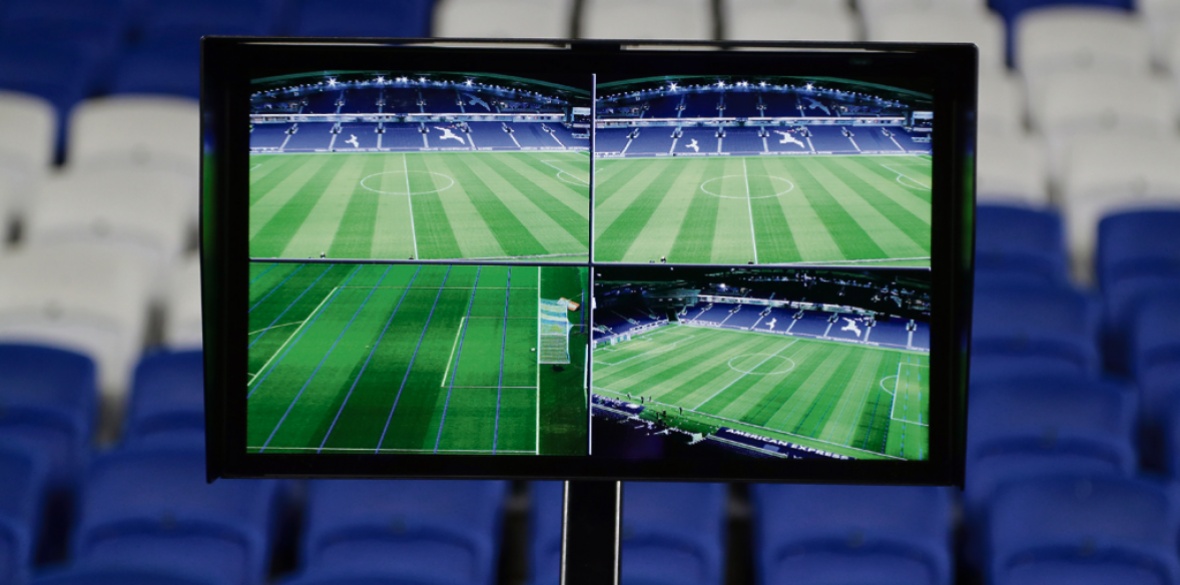This is the last article you can read this month
You can read more article this month
You can read more articles this month
Sorry your limit is up for this month
Reset on:
Please help support the Morning Star by subscribing here
VIDEO Assistant referee. VAR. Var. However you want to say it, a new piece of technology is sweeping football and it is dividing opinion.
It was widely accepted that some kind of technology was needed in the sport and, when goal-line technology was introduced, there were very arguments.
Given the Frank Lampard ghost goal at the 2010 World Cup and other similar incidents, many in Britain had called for its implementation.
But VAR has plenty of doubters and, given its mixed success so far, there is still a debate as to whether it is a useful tool.
If used correctly and sparingly, VAR can only help the game. Referees need help, we all know that. They can’t see everything. Nor can the assistants and players aren’t the most honest at times.
We’ve seen situations in the past month where goals have been given where a look at VAR would have disallowed it, Watford’s last-minute equaliser against Southampton immediately springs to mind.
Abdoulaye Doucoure blatantly handled the ball past Saints stopper Alex McCarthy and everyone except the men with the power to overrule the goal saw it.
Had VAR been in place, the goal is removed, Southampton win and the technology gets a pat on the back for doing its job.
Same with the offside for Kelechi Iheanacho’s goal in the FA Cup third round. At first it was disallowed for offside, but a quick check on the brand-spanking new video replay showed that the former Man City striker was in fact onside and he was allowed to celebrate.
When it works, it will save a lot of arguments and improve the sport.
However, there have already been too many incidents when the system has been used badly or not at all.
I was at the League Cup semi-final between Chelsea and Stamford Bridge a few weeks ago and the use of VAR was a shambles.
At times the referee was stood in the middle of the pitch, hand to his ear like a news reporter on live TV, and no-one knew what was going on.
It was unclear what he was checking, why he had chosen that particular incident and then he would blow his whistle and continue the game.
It became frustrating and everyone left that game feeling like VAR was a waste of time.
Another problem is the incidents VAR is being used for. Some tackles require multiple replays from a wide range of angles to work out whether it was a foul or not.
It means slowing down the footage to examine it frame by frame and even then it is hard to tell exactly what the outcome is.
The system should be used for the most obvious of incidents and not decisions based on personal perception or opinion. The “hand of god” moments if you will. The ones where from the replay you can instantly tell that the goal is offside or a handball or even the ball did in fact go out for a goalkick before the cross came in.
These aren’t exactly common in the game but are easily fixed.
Going back two minutes to see if there may have been a foul in the build-up is unnecessary.
Or looking at it to see if the contact in the box was enough to warrant a penalty. That comes down to personal opinion. One referee would say yes, another would say no.
So is asking for every tackle or corner to be reviewed. It would make the game tedious to watch and also be used to “slow the game down” by managers trying to waste time deliberately or to ease the pressure off their team for a few minutes.
Not to make the sport more like the NFL but give a team two challenges per game and that would immediately stop the players making the TV signal at the ref.
If players and managers knew that they had a limit on what they could challenge, they would use it preciously.
Perhaps they wouldn’t ask for a corner to be reviewed as it would be a total waste of a review.
While they say the technology will only be used for goal decisions, penalty incidents, red cards and mistaken identity, how far back will they review?
If Team A scores a goal but, in the build-up, Team B were denied what looked like a penalty two minutes earlier, are they going to chalk the goal off and give the spot kick?
It has happened in other countries and it’s no surprise that those leagues don’t like VAR.
One possible solution would be to take the decision out of the referees and his assistants hand give it to a group of separate trained officials, with no affiliation to the refs, who can point out straight away that something has been missed.
While it then creates more pressure on the refs to get things right at the first-time of asking, the current set-up still allows for mistakes and they are already creeping in to the game.
I get that this is still the teething process and it isn’t going to be perfect, but it is already becoming a farce and the project has barely got going.
Referees do need help and, if used correctly, VAR could solve a lot of issues in the game. It just needs to iron out a few kinks first.

 Kadeem Simmonds
Kadeem Simmonds








